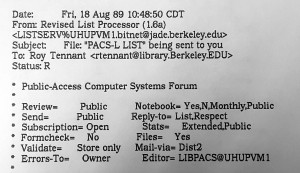 If you weren’t there in 1989, this is going to be very hard to imagine. But go ahead and try to picture this: the world without the web, without mobile (let alone smart) phones, without so many of the things that we take for granted today. The Internet was here, certainly, but only for some people (mostly those at large research universities) and it was extremely primitive.
If you weren’t there in 1989, this is going to be very hard to imagine. But go ahead and try to picture this: the world without the web, without mobile (let alone smart) phones, without so many of the things that we take for granted today. The Internet was here, certainly, but only for some people (mostly those at large research universities) and it was extremely primitive.
So when I attended the ALA Annual Conference in 1989 and discovered that Charles W. Bailey, Jr. at the University of Houston had established a BITNET mailing list for librarians at the end of June, I was all excited. Dubbed “PACS-L” for “Public Access Computer Systems” list, I was eager to sign up for it but I didn’t have a clue how to do it. It turned out the instructions passed out at the conference only worked if you were solely on BITNET. If you were on the true Internet, like I was, and only had a gateway to BITNET, how you subscribed was different. That sent me into a deep dive into the arcane world of BITNET, Unix, and the Internet, which had me printing out reams of documentation. I eventually succeeded in signing on, however, and was actually one of the first few dozen subscribers.
Early discussion topics included Hypercard, CD-ROM systems, local area networks, licensing agreements (some things never change), and much more. Check out the archive if you ever want to be entertained by what was top of mind then.
By the 18th of August there were just over 300 subscribers to this new discussion. Here are just a few of them, at least some of whose names you surely recognize:
- Ivy Anderson (then at Brandeis, now at the California Digital Library)
- Christine Borgman (UCLA)
- Sharon Bostick (then at Wichita State, now at the Illinois Institute of Technology)
- Marshall Breeding (then at , now a speaker and consultant)
- Priscilla Caplan (then at Harvard, now retired)
- Steve Cisler (then at the Apple Library, now unfortunately no longer with us)
- Walt Crawford (then at RLG, now writing and consulting)
- Selden Deemer (then at Emory, now at Biblio Solutions, LLC)
- Thom Hickey (OCLC)
- Judith Hopkins (University of Buffalo)
- Katharina Klemperer (then at Dartmouth, now a consultant)
- John MacColl (then at Glasgow, now at St. Andrews)
- Mike Ridley (then at McMaster, now at Guelph)
- John Ulmschneider (then at NCSU, now at Virginia Commonwealth University)
- Don Waters (then at Yale, now at the Andrew Mellon Foundation)
- Perry Willett (then at SUNY Binghamton, now at the California Digital Library)
For quite a while this list was where everything new in librarianship was happening. Despite its name, topics well beyond public access computer systems were discussed and debated. It was, in a nutshell, an essential place to hear and be heard. Its like was never to be again, as since then online communication channels have burgeoned and diversified. But for a little while, at least, there was a single place to be. And it was PACS-L.
Thank you, Charles, for that seminal move that brought so many of us together at such a key time in librarianship. I know that I’m not the only one who views those days with fondness — despite the turmoil, the uncertainty, and the joy of learning constantly and making things up as you went along.


Perhaps worth noting that Charles and friends also created one of the first OA journals, The Public-Access Computer Systems Review, in 1989 (first articles in 1990); it was groundbreaking during its existence. (Of course, it wasn’t called an “OA journal” because the term didn’t exist then.) Volume 2, number 1 offered a very early set of histories of very early OA journals.
Nice to call me a writer and consultant; no paid consulting done in a great many years, I’m afraid.
Thanks for this wonderful way to reminisce, Roy.
For the record, Judith Hopkins is also no longer with us. I didn’t know about Steve — sad!
I didn’t realize until *just now* that .edu and the real internet even existed in 1989. I thought that BITNET was the cat’s pajamas (or whatever the kids back then said) at that point.
Wonderful trip down memory lane!
I think the very first e-mail address I ever had was (which if I recall correctly, was an IBM mainframe). That would have been in either 1989 or 1990. I’m sure my original PACS-L subscription was under either that address or perhaps VSGA1001@SMUVM which I also used. But sometimes I also received BITNET list mail via VSGA1001%SMUVM1.BITNET[_at_] [followed by some other BITNET node at another location]. One can still find traces of these old addresses on the open web in various list archives, like PACS-L.
I recall that down in tech services where my wife worked, they would actually print out list messages once a week or so, and route them around the department like professional journals, because there weren’t enough mainframe terminals available for everyone to read them individually.
Will
Oops, the system stripped out the mainframe address: VSGA1001[_at_]VM.CIS.SMU.EDU because (I’m guessing) it was enclosed in angle brackets which was interpreted as HTML code or something. Not that it matters.